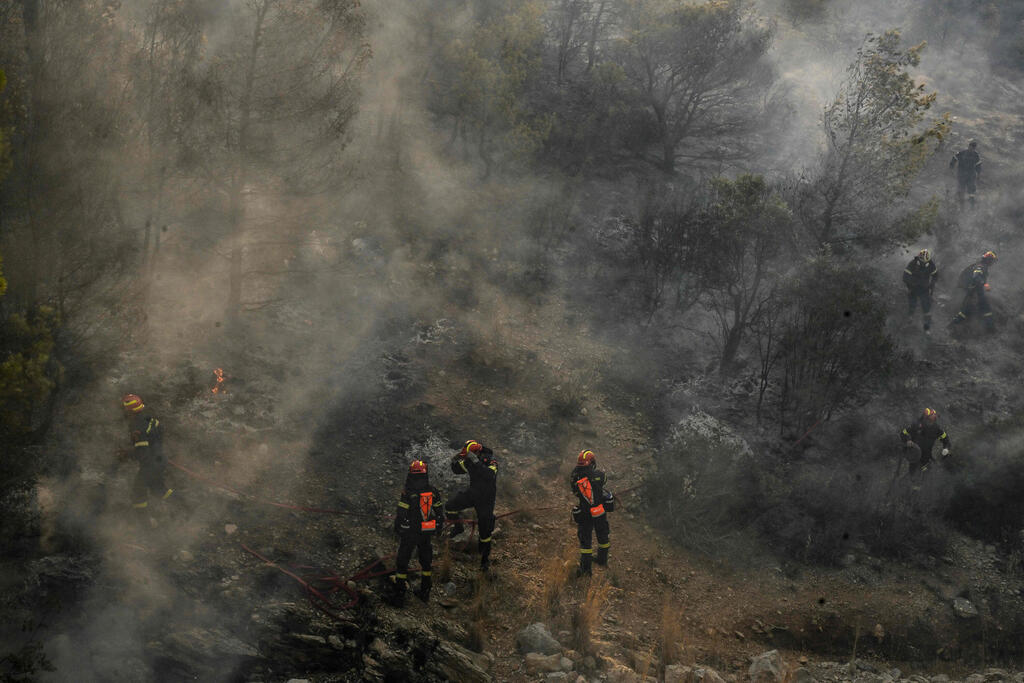The average global temperature for July 2023 was the highest ever recorded, the European Union-funded Copernicus Climate Change Service (C3S) reported Tuesday morning.
More stories:
Last month also saw the highest temperatures for a single day, with July 6 earning the dubious title of "hottest day in history."
From the data pertaining to the month of July, it was found that it was 0.72 degrees Celsius (1.3 degrees Fahrenheit) warmer than the average for July between 1991 and 2020. This was 0.33 degrees Celsius (0.59 degrees Fahrenheit) higher than the previous record for the hottest month in history, which was recorded in July 2019.
According to measurements, the average global temperature, encompassing both the Northern and Southern Hemispheres, on land and at sea, and in the air, was more than 1.5 degrees Celsius (2.7 degrees Fahrenheit) above the average from the years 1850 to 1900.
Many areas in the Northern Hemisphere experienced extreme heatwaves, including in Southern Europe. In several cities in North America and most of Antarctica, temperatures were measured much higher than average.
The oceans are also heating up. The average sea temperature has continued its upward trend, following an extended period of higher-than-normal temperatures since April 2023. This past July saw these temperatures hit new records. Global sea surface temperatures were 0.51 degrees Celsius (about 0.918 degrees Fahrenheit) higher than the 1991-2020 average. C3S data also indicates that marine heatwaves have developed in northern Greenland and across the Mediterranean Sea.
"Record-breaking temperatures are part of the trend of drastic increases in global temperatures. Anthropogenic emissions are ultimately the main driver of these rising temperatures," said C3S Director Carlo Buontempo.
“July’s record is unlikely to remain isolated this year, C3S’ seasonal forecasts indicate that over land areas temperatures are likely to be well above average.”
“The extreme weather which has affected many millions of people in July is unfortunately the harsh reality of climate change and a foretaste of the future,” said World Meteorological Organization’s Secretary-General Prof. Petteri Taalas. “The need to reduce greenhouse gas emissions is more urgent than ever before. Climate action is not a luxury but a must.”
"It's really no surprise to anyone following the data in real-time," says Dr. Or Bialik, a researcher at the Leon H. Charney School of Marine Sciences at the University of Haifa and a research fellow at the University of Münster in Germany.
"Over the past few weeks, we've seen that we're entering a drastic peak in terms of temperatures. Temperatures in the North Atlantic Ocean have reached 25 degrees Celsius (77 degrees Fahrenheit). NOAA (the U.S. National Oceanic and Atmospheric Administration) issued a warning estimating that coral species in the Caribbean are at risk of mass bleaching events, and the sea ice in Antarctica is at its lowest level ever recorded. What's extraordinary is that this is happening during the winter in the Southern Hemisphere, a time when ice usually accumulates."
Dr. Bialik added, "Every metric we've observed since mid-May has been breaking records one after the other. According to certain measures, this might be the hottest Northern summer in the last 120,000 years. We are approaching a 'tipping point' for some of the systems that maintain Earth's climate stability. How, when, and why we might cross that line, we don't know. We might have already passed it."
He warned of the severe consequences of global warming. "In recent years, we've talked about tipping points, bringing us to a point of no return in terms of feedback processes," said Dr. Bialik.
"What does it mean when we pass them? It's possible that the deep parts of the ocean will lose oxygen, amplifying some of the processes we see on the surface, and destroying entire ecological systems. We must remember that the ocean is the climate regulator on Earth. It absorbs most of the accumulated heat. The situation is not good."
Dr. Bialik stated that all nations must act quickly to significantly reduce greenhouse gas emissions. "What's been happening over the past 200 years is unprecedented," he said. "The amount of methane, nitrous oxide and of course carbon dioxide, released into the atmosphere in the last two centuries is at an unparalleled rate. It's very easy to knock the system out of balance, and it takes a long time for it to return to equilibrium."
"People can be told to fly less, eat less meat, but the issue is too vast for any one individual to effect significant change on their own. If we can reduce emissions at the required rate, which is very rapid, we might be able to save ourselves. We face a major challenge in that many countries are reluctant to take the first step. We'll see spikes in food prices and climate refugees, as certain island nations will be underwater, and there will simply be an environmental pressure crisis combined with a food and water shortage. Undoubtedly, this isn't good news."
In Israel: July was significantly hotter than average
July was notably warmer than the average, ranking second compared to previous records, after July 2017, in the series of spatial measurements since 1950. In some regions, it was the hottest July in terms of maximum daily temperatures.
However, in terms of minimum daily temperatures, it wasn't ranked high since the nights in the coastal plains and valleys were not particularly warm, and at some stations, it was even close to the average. This emerges from a review by the Meteorological Service, published earlier this month.
The data further indicates that during daytime hours, July was warmer than the Israeli average (from 1991 to 2020) in most parts of the country by 2 to 2.5 degrees Celsius (3.6 to 4.5 degrees Fahrenheit). Nighttime temperatures varied across different parts of the country.
In the Upper Galilee and the Judean Mountains, temperatures were above average by 2 to 2.5 degrees Celsius (3.6 to 4.5 degrees Fahrenheit) on average, in the Negev and the Arava by 1 to 1.5 degrees Celsius (1.8 to 2.7 degrees Fahrenheit), and in the coastal plain and the lowlands by 0.5 to 1 degree Celsius (0.9 to 1.8 degrees Fahrenheit). In the foothills of the Judean Mountains and the Lower Galilee, nighttime temperatures were close to or slightly above average. In the northern valleys, they were close to the average, and in the Golan Heights, they were even slightly below average.
The Meteorological Service reported that in the series of spatial measurements since 1950, July 2023 ranks second in terms of daily temperature (the combined temperature of day and night). July 2017 was warmer, while the Julys of 2000 and 2012 were on average similar to this July.
The Meteorological Service emphasized that the 15 hottest Julys in Israel have all been recorded since the year 2000. This clearly underscores the pronounced warming trend observed over the past two to three decades.
Additionally, the Meteorological Service pointed out that when compared to past summer months, the Augusts of 2010, 2015 and 2021, as well as September 2020, were hotter than this year's July in Israel.






